With the Philadelphia School District facing a potential annual shortfall of $800 million in five years, some faculty members at the University of Pennsylvania are pushing their employer to pay up to $40 million to the city.
The money, known as payments-in-lieu-of-taxes, or PILOTS, represents a portion of what Penn would owe in taxes if not for its nonprofit status. Other universities in the Ivy League pay them.
“Penn is the largest private landowner in Philadelphia,” said Gerald Campano, a professor in the university’s graduate school of education. “It is one of the city’s largest employers. It is a wealthy nonprofit and it doesn’t pay property taxes, and property taxes are the main local source of money for the Philadelphia schools.”
A longstanding campaign to force the city’s biggest nonprofits to make voluntary payments to the city has taken on new urgency this year as the school district faces a steep drop in revenue largely due to shrinking state and local tax collection caused by the coronavirus pandemic.
“We are here because Philadelphia children face a terrible funding shortfall,” said Ann Farnsworth-Alvear, associate professor of history and Latin American and Latino studies. “Inadequate resources for public education are damaging our city.”
She said that if Penn isn’t paying its “fair share,” it hurts small businesses and low-income homeowners, who must pay more. With a poverty rate above 25%, Philadelphia is the poorest big city in the country. Mayor Jim Kenney’s effort this year to slightly increase the property tax rate to raise more money for schools died in the city council, mostly due to concerns about putting a larger burden on the poor.
Schools in Philadelphia and elsewhere in Pennsylvania are paid for primarily through a combination of state and local taxes. State revenue is designed to make up for differences in property wealth among districts.
Pennsylvania has enacted a “fair funding” formula for distributing state aid that takes into account a district’s needs relating to poverty, English language learners, and other factors. But it does not use the formula to distribute most of the money. And the amount of funds it contributes to education has not kept up with need. On average, states contribute about half of state aid to education; in Pennsylvania, the figure is closer to a third, which increases districts’ reliance on property wealth.
Philadelphia has a $3.4 billion operating budget for both district and charter schools, 49.9% of which is contributed by the state and 49.6% by the city. And the real estate tax is responsible for the 51% of the local share — $825 million, or about a quarter of its total revenue.
The advocates say that Penn, between the university and hospital system, owns $2.5 billion worth of land and has a $14.7 billion endowment. They want Penn to pay 40% of what it would if it paid taxes on its property, which would amount to around $40 million. “Those payments alone would allow the school district to remove the lead and asbestos from school buildings in three years,” said Farnsworth-Alvear. The renewed push for PILOTS has been “inspired by a lot of important social protests that are going on and by the country’s racial reckoning” in the wake of the death of George Floyd, a Black man killed by a police officer in Minneapolis, said Campano.
An Inquirer investigation from a year ago estimated that nearly $30 billion in city real estate is exempt from taxes, more than 10% of the available land, a much higher amount than the average for major cities.
Jobs with Justice is calling for the creation of an Education Equity Fund that would help the cash-strapped district fix aging and sometimes dangerous buildings, as well as hire more counselors, nurses and teachers.
A petition circulated by the faculty group has gathered 1,000 signatures, and 68 faculty members are seeking a meeting with Penn’s Board of Trustees, which is chaired by David L. Cohen, Comcast’s senior executive vice president.
Farnsworth-Alvear said that faculty members also sent letters to 16 individual Penn trustees in late July, but have not gotten a response. They want the trustees to put the issue on the agenda of Thursday’s virtual budget and finance committee meeting.
In resisting past calls for PILOTS, Penn officials have noted that the university contributes to the city in myriad ways, including its support of the Penn-Alexander Elementary School near its campus and through many social programs run by the affiliated Netter Center, which coordinates community partnerships with the university.
Reached through Comcast’s communications office, Cohen did not offer comment.






